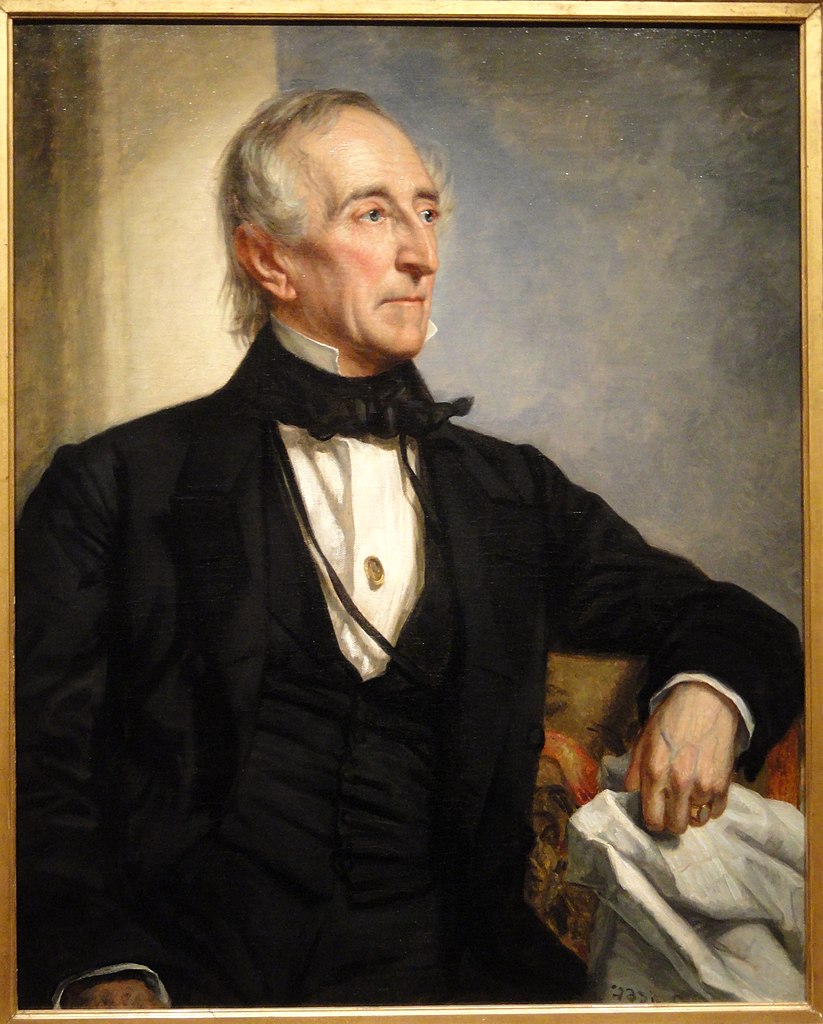John Tyler was the 10th President of the United States and one of the only Presidents to never be elected. Although his Presidency was controversial, he was the first to enforce the Constitution of the United States after the death of a President who was still in office.

The Constitution says that in the event that the President dies while in office, the Vice President then becomes President and finishes the term until the next elections are held.
There was some dispute after the death of William Henry Harrison over who should become President.
John Tyler established that precedent, which would be followed by fellow Presidents Millard Fillmore, Andrew Johnson, Chester A. Arthur, Theodore Roosevelt, Calvin Coolidge, Harry Truman, Lyndon Johnson, and Gerald Ford.
Election of 1840
Months after Martin Van Buren took office, the Panic of 1837 destroyed his opportunity for re-election. The Whigs took complete control of the Congress in the 1838 elections, and support for the Whigs grew much more for the Presidency.
William Henry Harrison secured the nomination with his running mate, John Tyler. The slogan “Tippecanoe and Tyler Too!” became the battle cry for the Whig nomination for President. Martin Van Buren secured the Democrat nomination but was a weak candidate.
As a result, William Henry Harrison won by a landslide. At his inauguration, he gave the longest inauguration speech in the pouring rain.
Vice-Presidency and Presidency
William Henry Harrison was a popular war hero who ventured into politics after the War of 1812.
He quickly rose to prominence and eventually secured the Presidency and chose John Tyler as his running mate.
His death came as a shock, and Tyler was sworn into office, thus becoming the first President of the United States to take over after a President died in office. He set an important precedent that would continue in the future. Even so, he was dubbed "His Accidency."
John Tyler quickly came into conflict with the Whig Party when he refused to pass a national banking act. The expiration of the Second National Bank was considered the main cause of the Panic of 1837, which ended the presidency of Martin Van Buren before it ever began.
Tyler's predecessor, William Henry Harrison, campaigned on the idea that he was going to renew the National Bank of the United States and was elected due to that.
However, Tyler vetoed the legislation and then vetoed it again when it was adjusted to make his demands. This caused many resignations by the Whigs and eventually the expulsion of John Tyler from the Whig Party. He quickly became a President without a party.
During the Presidency of Andrew Jackson, the federal government paid off the rest of its outstanding debt. However, it was short-lived as the nation plunged into debt due to the Panic of 1837, and by the time John Tyler took office, the federal government had an $11 million deficit in spending.
The popular belief was to raise tariffs, which he did not want to do but did so reluctantly. The Whigs did not want to increase the tariffs as it would hurt the distribution of income to the states.
The Whigs then passed two bills that would raise the tariffs and unconditionally extend the distribution program. Tyler vetoed both, which resulted in the Whigs moving towards impeachment.
Impeachment
Before Andrew Jackson, the veto of the President was not used in disagreements with policy, but rather if something was considered unconstitutional. Andrew Jackson, who wanted to limit the power of the government, vetoed more bills than any other President in the young nation's history.
His successors also began using the veto for policy issues rather than constitutional issues. This is just one of the reasons that the Whigs moved to impeach Tyler. However, they did not succeed, and Tyler won 127 votes to 83.
During the next Congressional elections, the Whigs lost control in the House. The result was that they could no longer pursue Tyler's impeachment. Congress did pass a minor revenue bill that Tyler vetoed. This marked the first time that a President's veto was overridden.
Texas Annexation
The main issue during Tyler's presidency was the issue of the Annexation of Texas. Andrew Jackson and Martin Van Buren had not pursued its annexation due to the issue of slavery. However, Tyler saw it as not only a priority but the only way he could win an independent election in 1844.
Late into his presidency, he began to pursue it. His pursuit on this issue did little to aid him in re-election.
Realizing that he had no chance for re-election, he began to try and change the public opinion of the Annexation of Texas. His opportunity came in the form of the man James K. Polk.
James K. Polk came from nowhere to win the Democratic nomination for president when he defeated Martin Van Buren. While Polk was a student of the idealogy of Andrew Jackson, he was also pro-annexation.
This provided an edge for the Democrats against the Whigs, who opposed the annexation. Once Tyler had successfully turned public opinion in favor of annexation, he threw his support behind Polk.
James K. Polk would go on to become the next President of the United States. During his presidency, the United States would go to war and defeat Mexico in the Mexican-American War. Texas would be admitted to the union in 1845.
Legacy
President John Tyler was not an effective president. He was unsuccessful with domestic, foreign, and economic policies. He alienated himself from his party when he went against the policies that William Henry Harrison had campaigned on.
Even with many of these failures, he did manage to set an important precedent. He was the first President to successfully take over the Presidency after the sitting President died in office.
He did so without a military coup or revolution.
